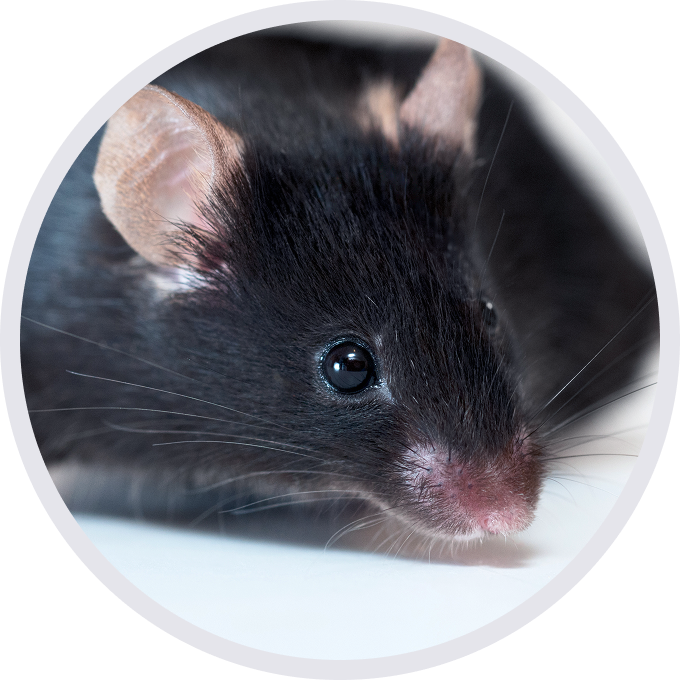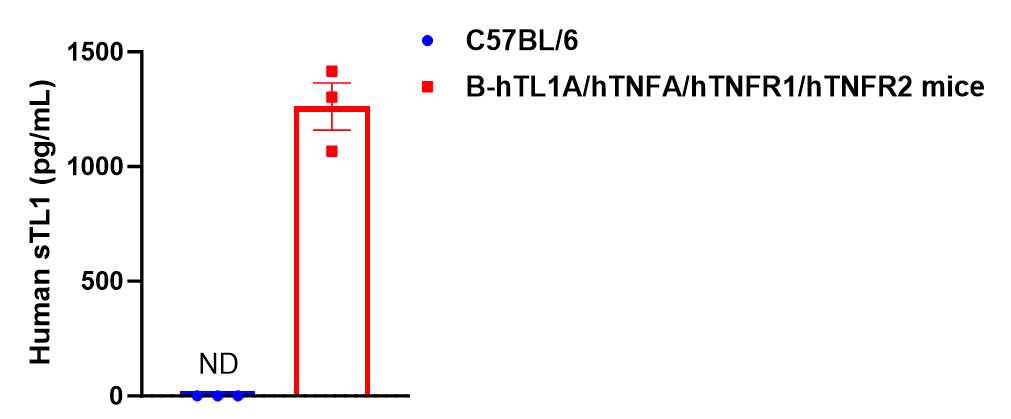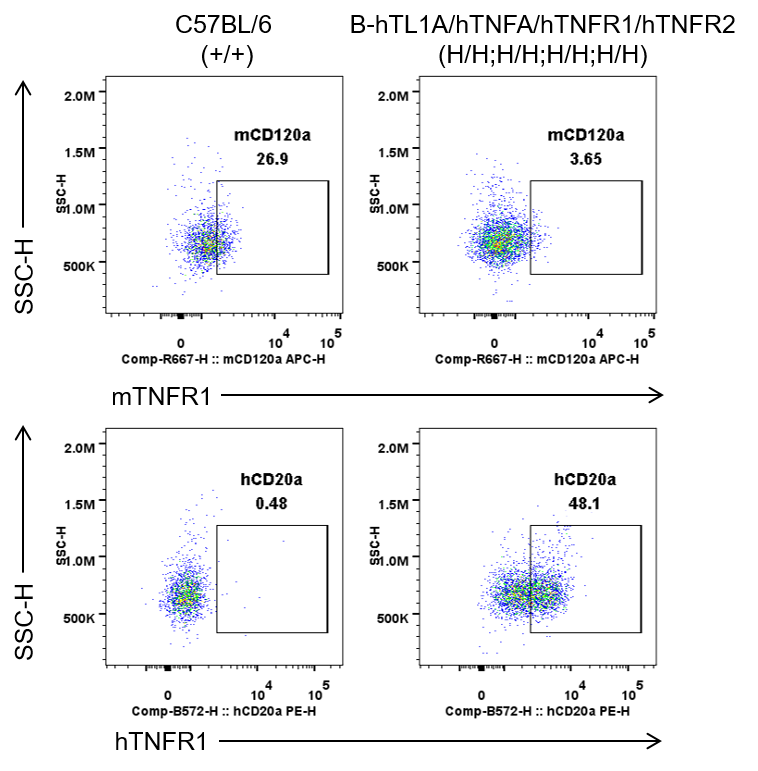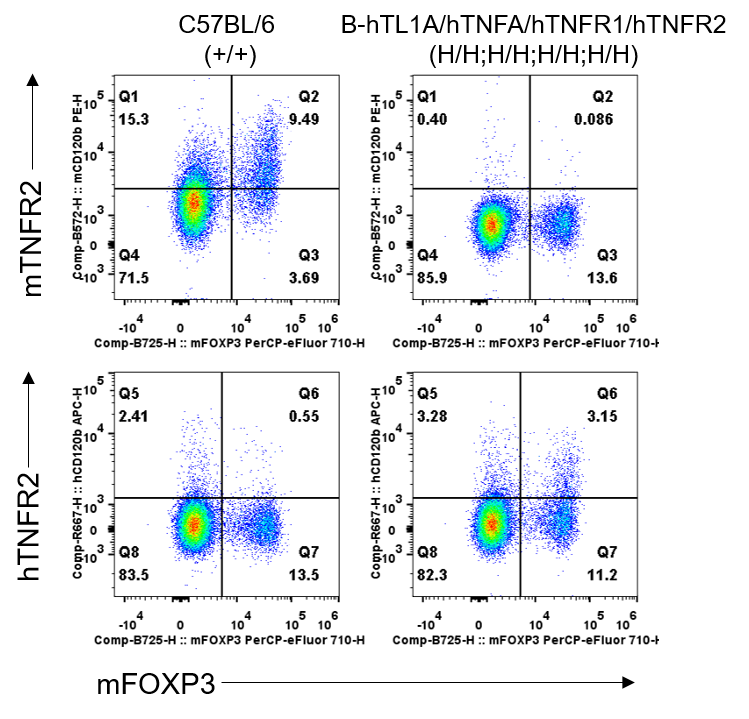
C57BL/6-Tnfsf15tm2(TNFSF15)Bcgen Tnftm1(TNF)Bcgen Tnfrsf1atm1(TNFRSF1A)Bcgen Tnfrsf1btm1(TNFRSF1B)Bcgen /Bcgen • 113030

| Product name | B-hTL1A/hTNFA/hTNFR1/hTNFR2 mice |
|---|---|
| Catalog number | 113030 |
| Strain name | C57BL/6-Tnfsf15tm2(TNFSF15)Bcgen Tnftm1(TNF)Bcgen Tnfrsf1atm1(TNFRSF1A)Bcgen Tnfrsf1btm1(TNFRSF1B)Bcgen /Bcgen |
| Strain background | C57BL/6 |
| NCBI gene ID | 9966,7124,7132,7133 (Human) |
| Aliases | TL1; TL1A; VEGI; TNLG1B; VEGI192A; DIF; TNFA; IMD127; TNFSF2; TNLG1F; TNF-alpha; FPF; p55; p60; TBP1; TNF-R; TNFAR; TNFR1; p55-R; CD120a; TNFR55; TNFR60; TNF-R-I; TNF-R55; p75; TBPII; TNFBR; TNFR2; CD120b; TNFR1B; TNFR80; TNF-R75; p75TNFR; TNF-R-II |
Gene targeting strategy for B-hTL1A/hTNFA/hTNFR1/hTNFR2 mice.
The exons 1-4 of mouse Tl1a gene that encode extracellular domain were replaced by human counterparts in B-hTL1A/hTNFA/hTNFR1/hTNFR2 mice. The genomic region of mouse Tl1a gene that encodes transmembrane domain and cytoplasmic portion was retained. The promoter, 5’UTR and 3’UTR region of the mouse gene were also retained. The chimeric TL1A expression was driven by endogenous mouse Tl1a promoter, while mouse Tl1a gene transcription and translation will be disrupted.
The exons 1-4 of mouse Tnfa gene that encode signal peptide, extracellular domain, transmembrane domain, cytoplasmic region and 3’UTR are replaced by human counterparts in B-hTL1A/hTNFA/hTNFR1/hTNFR2 mice. The promoter and 5’UTR region of the mouse gene are replaced by human counterparts. The human TNFA expression is driven by human TNFA promoter, while mouse Tnfa gene transcription and translation will be disrupted.
The exons 2-6 of mouse Tnfr1 gene that encode extracellular domain are replaced by human counterparts in B-hTL1A/hTNFA/hTNFR1/hTNFR2 mice. The genomic region of mouse Tnfr1 gene that encodes transmembrane domain and cytoplasmic portion is retained. The promoter, 5’UTR and 3’UTR region of the mouse gene are also retained. The chimeric TNFR1 expression is driven by endogenous mouse Tnfr1 promoter, while mouse Tnfr1 gene transcription and translation will be disrupted.
The exons 2-6 of mouse Tnfr2 gene that encode extracellular domain are replaced by human counterparts in B-hTL1A/hTNFA/hTNFR1/hTNFR2 mice. The genomic region of mouse Tnfr2 gene that encodes transmembrane domain and cytoplasmic portion is retained. The promoter, 5’UTR and 3’UTR region of the mouse gene are also retained. The chimeric TNFR2 expression is driven by endogenous mouse Tnfr2 promoter, while mouse Tnfr2 gene transcription and translation will be disrupted.

Soluble TL1A expression analysis in B-hTL1A/hTNFA/hTNFR1/hTNFR2 mice by ELISA. Bone marrow derived dendritic cells (BMDCs) were produced by culturing the bone marrow from wild-type C57BL/6 (+/+) and homozygous B-hTL1A/hTNFA/hTNFR1/hTNFR2 mice (H/H;H/H;H/H;H/H), which were stimulated with LPS in vitro for 24 hrs. After stimulation, the supernatants were collected and the levels of soluble TL1A were measured using a species-specific human TL1A ELISA kit (R&D, DY1319-05). Soluble human TL1A was exclusively detectable in homozygous B-hTL1A/hTNFA/hTNFR1/hTNFR2 mice but not in wild-type C57BL/6 mice. Values are expressed as mean ± SEM. ND: not detectable.

Strain specific TNFA expression analysis in wild-type C57BL/6 mice and B-hTL1A/hTNFA/hTNFR1/hTNFR2 mice by ELISA.
Serum were collected from wild-type C57BL/6 (+/+) and homozygous B-hTL1A/hTNFA/hTNFR1/hTNFR2 mice (H/H;H/H;H/H;H/H) stimulated with LPS in vivo for 1 h, and analyzed by ELISA with species-specific mouse TNFA ELISA kit (Biolegend, 430907) and human TNFA ELISA kit (Biolegend, 430207). Mouse TNFA was detectable in wild-type C57BL/6 mice. Human TNFA was exclusively detectable in homozygous B-hTL1A/hTNFA/hTNFR1/hTNFR2 mice. Values are expressed as mean ± SEM. ND: not detectable.

Strain specific TNFR1 expression analysis in wild-type C57BL/6 mice and homozygous B-hTL1A/hTNFA/hTNFR1/hTNFR2 mice by flow cytometry. Splenocytes were collected from wild-type C57BL/6 mice (+/+) and homozygous B-hTL1A/hTNFA/hTNFR1/hTNFR2 mice (H/H;H/H;H/H;H/H), and analyzed by flow cytometry with species-specific anti-mouse CD120a antibody (Biolegend, 113005) and anti-human CD120a antibody (Biolegend, 369903). Mouse CD120a was only detectable in wild-type C57BL/6 mice. Human CD120a was exclusively detectable in homozygous B-hTL1A/hTNFA/hTNFR1/hTNFR2 mice.

Strain specific TNFR2 expression analysis in wild-type C57BL/6 mice and homozygous B-hTL1A/hTNFA/hTNFR1/hTNFR2 mice by flow cytometry. Splenocytes were collected from wild-type C57BL/6 mice(+/+) and homozygous B-hTL1A/hTNFA/hTNFR1/hTNFR2 mice(H/H;H/H;H/H;H/H), and analyzed by flow cytometry with species-specific anti-mouse CD120b antibody (Biolegend, 113405) and anti-human CD120b antibody (Biolegend, 358406). Mouse TNFR2 was only detectable on Treg cells of wild-type mice. Human TNFR2 was detectable on Treg cells of homozygous B-hTL1A/hTNFA/hTNFR1/hTNFR2 mice.